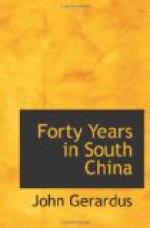Answer. Yes. It would be a great misfortune for the native churches to be governed by the missionaries, or by the home churches. We think also it would be a great misfortune for the missionary to refuse all connection with the government of the mission churches while they are in whole or in part dependent on him for instruction, administration of the ordinances, and pastoral oversight. Self-support, self-government, and self-propagation are intimately related, acting and reacting on each other, and the native Church should be framed in them from the beginning of its existence.
4. “Is it the opinion of missionaries at Amoy that the native Presbyters are competent to manage the affairs of Presbytery, and could they safely be left to do so?”
Answer. Yes; the native Presbyters seem to us to be fully competent to manage the affairs of Presbytery, and we suppose it would be safe to leave them to do this entirely by themselves, if the providence of God should so direct. We think it much better, however, unless the providence of God direct otherwise, that the missionaries continue their present relation to the Tai-hoey until the native Church is farther developed.
5. “Is it likely that there can be but one Presbyterian Church in China? or are differences of dialect, etc., such as to make different organizations necessary and inevitable?”
Answer. All Presbyterians in China, as far as circumstances will allow, should unite in one Church organization. By all means avoid a plurality of Presbyterian denominations in the same locality. But differences of dialect and distance of separation seem at present to forbid the formation of one Presbyterian organization for the whole of China. Even though in process of time these difficulties be greatly overcome, It would seem that the vast number of the people will continue to render such formation impracticable, except on some such principle as that on which is formed the Pan-Presbyterian Council. One Presbyterian Church for China would be very



